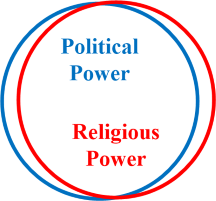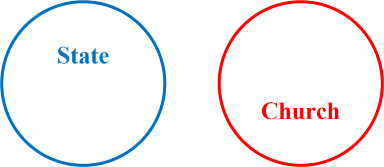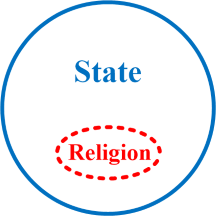 Article 11 in a Series (see full lnterfaith list here)
Article 11 in a Series (see full lnterfaith list here)
This final article continues discussions from last time considering why God must be good. To go further, someone good must be just, as justice is the virtue of giving each their due. The worker earns their wages and should be paid what they have earned. It is morally right. Doing the moral thing is good. Therefore a moral being must give someone what they have earned. As God is not only good, but the source of good, He must also be morality’s source.
Don’t Let Go of God’s Moral Instructions, No Matter What
As God is creation’s creator, He is also its governor. In Jonathan Edwards’ words,
[T]he Creator of the world is doubtless also the Governor of it. He that had power to give being to the world, and set all the parts of it in order, has doubtless power to dispose of the world, to continue the order he has constituted, or to alter it.[1]
Governance requires communication. As governor, God’s law is a means of communicating His commands to His creation. As creator, His law is supreme. Man’s disobedience is therefore rebellion, a rebellion that is the closest man can come to committing a capital crime against God. If God is just, man must be punished. There is no balance, no mixing of good works and bad works. Virtue is not a balance. There are only fully virtue and vice.
Christianity provides a simple solution to a pagan paradox. “Paganism declared that virtue was in a balance. Christianity declared it was in a conflict; the collision of two passions apparently opposite.”[2] Conflict within a will to do good or evil, to promote virtue or practice vice. This view is Christianity’s key to ethics. Paganism holds this passion to be a mixture, a blending of white and black into gray. Accepting the pagan view means becoming not too much of anything. One is neither too prideful nor too humble, too boastful nor too meek. However, when one is not too much of anything, they are also not much of anything. We do not fulfill our purpose or utilize the gifts we have each been given.
Suicide and Martyrdom
We can examine suicide and martyrdom as a practical application. Some free thinkers say there is no difference between the two. Christianity holds they are opposites. The difference is in love. The suicide cares so little for them self that they are unwilling to live. The martyr loves another so much that they are willing to die for them. Suicide is a lack of love even for self, it centers around self-interest. Martyrdom emphasizes self-sacrifice for another. Saying these are the same is not only foolish but illogical.
Pagan thought would assert oil and water to be a type of balance between liquids, but this is only possible if you spin them together fast enough in a small enough circle to make them appear to come together. It requires exerting continuous force to deny their nature. The more you wish them to blend, the greater the effort needed. They naturally separate, and this is Christianity’s point. It simply acknowledges the nature of each, and that each is both fully present and fully different. One can draw a hippopotamus to look like a horse, but then it is no longer a hippopotamus.
This difference between suicide and martyrdom can be further illustrated using the suicide bomber and Christ’s crucifixion. But first we need to complete a point. Christ’s nature presents another paradox, one which the Christian approach resolves. Christianity asserts Christ is fully man and fully God. Every heresy about Christ’s nature asserts He is either only man, only God, or a mixture of the two—an application of the pagan world view—neither fully man nor fully God.
Christ’s love for each and every one of us is attested to by His giving His life for us. His self-sacrifice paid the price for man’s rebellion, one time for all time as He was God and He was man. Justice required such a sacrifice. A suicide bomber, on the other hand, cares so little for their own life that they are willing to end it, and take as many others with them as they can. It is an act of hopelessness, done in the hope of being rewarded. But if God made creation out of love, then answer why He would reward such a hateful act? It is unjust, giving to another what they are not due. Therefore the bomber’s act is not good. It is not the action of a martyr, but one of suicide. “The man who kills himself, kills all men; as far as he is concerned he wipes out the world.”[3]
We’ve laid out the need for justice and morality which are exercised through governance, and that is where we turn next.
Don’t Let Go of God’s Governance, No Matter What
This section largely uses history. Early state religion society’s such as Assyria, Babylonia, Egypt, Greece, and Rome all believed that political and religious power were closely related.[4] Not the same but closely intertwined, as shown below.

This relationship was emphasized by rule through either a king and/or priest. Sometimes both roles were filled by members from the same family, and sometimes by the same person. At times the ruler came to be a god them self, such as Egypt’s Pharaohs or Rome’s Caesars. This relationship was emphasized by placing the temple and palace in close proximity, normally on high ground within a city—an acropolis so all would see and understand this relationship.
Church and State are Not One
Again we see a pagan blending of things. Christianity resolves this paradox again by saying both powers are fully present and fully separate as shown below. The use of Church and State represents the shift from power to the modern institutions which wield those same powers.

This is what Christ meant when He said, “Then render to Caesar the things that are Caesar’s; and to God the things that are God’s.”[5] But this idea was not new. For the Jewish people, it had been the case since receiving The Law. Moses led the Jewish people. His brother Aaron was chief priest. It was so until the kingdom of Judah’s defeat by Babylonia. Both Moses and Aaron were turned toward God, as Creator all power’s source. Both men served Him, and by serving Him also served their people. Leaders exist to serve both God and their people.
Leadership Does Not Come from an Elite
The Jewish people rejected God as their king and petitioned Samuel to place a human king above them, as existed in the surrounding kingdoms.
So who is to wield power? Within pagan society, it is those who are viewed as being the most fit, those that have the natural gifts of leadership, the elite. This view arises from the belief that all are not equal, but rather some are more equal than others. Their rule is fitting and just, and war against those who will not submit is proper.[6] Doesn’t this sound like where we have been heading as a society for the last twenty five years or so? These views come directly out of pagan philosophy, such as Plato and Aristotle.
Christianity, on the other hand, asserts that leadership should be based upon merit, come from within a society, and elected by those within that society. This is demonstrated by the Israelites electing the judges under Moses recorded in Deuteronomy.[7] These judges were to execute justice, and do so in all righteousness, as the final judgement is God’s. This leads us to the final point in this section, what power is each sphere to wield?
Rights Do Not Come from the State
All societies need a moral basis to be successful in the long run. Even Machiavelli did not deny this. He saw religion as a useful tool to instill morality within a people, it was only the ruler needed to be outside that morality so they could exercise the State’s responsibilities. Within pagan thought we again see a blending. This time one of powers. A morality defined by the State, in the interest of the State, for the perpetuation of the State. Ideas again coming from pagan philosophers such as Plato and Aristotle. People exist to serve and perpetuate the State.
The post-modern notion of political and religious power is shown in the diagram below, and very similar to Islam where Church and State are one. Other ideologies such as communism, attempted to deny religion altogether, but those efforts failed. The church existed in communist Russia, and exists today within the People’s Republic of China.

Christianity again resolves a paradox by keeping the powers of morality and justice separate. Morality is to be instilled in the people through their personal relationship with God. A personal relationship as love is involved, and love requires an object as argued in the last article. This is the province of the Church. But not all men subscribe to such thoughts, and such men commit unjust acts such as rape, robbery, murder, and deceit. Administering justice is the purpose of the State, when individuals chose to act in an unjust manner. To be sure, it is only earthly justice, as we cannot see other men’s hearts, only God can do that. Both morality and justice are separate, fully present, and fully active at the same time.
Since God is creation’s governor, His law is supreme. That law is communicated to us through His Word. Man can make additional laws, and even create additional ‘rights’. However, they must not violate the supreme law. They can only be additions to, not deletions from, and must align with God’s law—they must promote justice. Often man created rights do not promote justice. Take abortion. God’s law says one does not kill. Man grants the right of abortion as he concludes there is no life yet. We know the difference between justice and injustice by the fruit a law bears. Does it lead to greater unity, peace, prosperity, and virtue as these things are from God. Or does it promote division, conflict, envy, and vice? These latter things come from Satan, and men acting in Satan’s name.
Some Final Thoughts About the Current Leftist Lunacy
Performing acts for the good of others requires self-sacrifice, what Christ asks from us. It is summarized in the notion of charity, the virtue by which all other virtues find fulfillment as charity orients man to God. Pagan thought looks to self-interest, requiring another take action for their own good, and often the persons creating such requirements excluding themselves. Kind of like a parent saying do as I say and not as I do. Doesn’t that sound like today’s political elite and entitlements such as healthcare?
I believe President Trump truly cares and is trying to do what he believes to be the right thing. He is not perfect, none of us are. He sometimes gets off message, but the underlying message is one of unity, peace, and prosperity. He deserves the chance to provide the opportunity for us to turn in the right direction. That is all that any leader can and should do. So why is the political left trying so hard to prevent us having that opportunity?
Of Statues and History
One quick example. Tearing down statues won’t end with those of the confederacy. We’ve already seen that in other defacements and calls to destroy national monuments. I recently saw a person calling himself a minister say these actions are okay as we teach history. The problem is that is a lie.
The evidence is simple and direct. These statues were erected as reminders of our past—both good and bad. History provides the facts and context; the statues and monuments reminders of its lessons, both good and bad. What is taught today and called history cannot be history. We can see it in the blind rage with which people attempt to destroy these statues and hurt anything standing in their way. They either do not know history, do not understand it, or reject it. Their actions destroy the very reminders intended to prevent such things from happening again, and as a result will likely happen again.
Good and Evil
We see in the above actions a pagan mixing of good and evil. Of evil actions performed in the name of good. Acts of lawlessness. When someone puts themselves above the law, they claim their lives matter more. By extension they also claim that other lives matter less, the very opposite of their proclaimed justification. The truth is that either all lives matter or no lives matter. It does not matter whether it is white supremacists or Black Lives Matter. They are the same, both choosing to do evil in the name of some good. Both viewing the world through the lens of race, the very definition of racism.
We are teaching our children to become protesters instead of citizens. We are indoctrinating with ideology instead of teaching ideas. We are teaching them hate and loathing instead of love and respect. They are our children and deserve better. That will only happen when we as a society are willing to stand up and demand it, when we are willing to sacrifice on their behalf.
God’s Peace and Blessings to you all. I pray we all choose good.
Dan Wolf is a researcher, analyst, and author. He has written three books examining the relationship between faith, freedom, virtue, and charity. Together these form the cornerstone of our purpose, and our society’s foundational principles derived from those relationships. Links to his work can be found at the Living Rightly website.
[1] Edwards, Jonathan, The Works of Jonathan Edwards, Vol. 2, p. 937, Hendrickson Publishers, 2006.
[2] Chesterton, G.K., Orthodoxy, p.59, Jefferson Publication, 2015.
[3] Ibid, p. 45.
[4] For a fuller discussion of this topic, please see Wolf, Dan, Collectivism and Charity: The Great Deception, pp. 37-57, living rightly publications, 2016.
[5] Matthew 22:21, New American Standard Bible.
[6] For a more thorough discussion, see Wolf, Dan, Do You Want To Be Free, pp. 26-31, Telemachus Press, 2013.
[7] The full passage, Deuteronomy 1:13-17, reads, “’Choose wise and discerning and experienced men from your tribes, and I will appoint them as your heads.’ You answered me and said, ‘The thing which you have said to do is good.’ So I took the heads of your tribes, wise and experienced men, and appointed them heads over you, leaders of thousands and of hundreds, of fifties and of tens, and officers for your tribes. “Then I charged your judges at that time, saying, ‘Hear the cases between your fellow countrymen, and judge righteously between a man and his fellow countryman, or the alien who is with him. You shall not show partiality in judgment; you shall hear the small and the great alike. You shall not fear man, for the judgment is God’s …”




